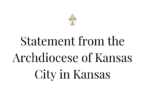Revised mandate still violates freedom of religion and conscience
by Joe Bollig
joe.bollig@theleaven.org
KANSAS CITY, Kan. — President Barack Obama described the recent modification of his birth control mandate as “basic fairness,” but the U.S. bishops say the “fix” is no fix at all — it still violates freedom of religion and conscience.
On Feb. 10, Obama sought to dampen a blaze of controversy that arose following the Jan. 20 announcement by U.S. Department of Health and Human Services Secretary Kathleen Sebelius of a birth control mandate that is part of Obama’s 2010 Patient Protection and Affordability Act.
In the version of regulations released by Sebelius in January, some Catholic entities would be forced to provide birth control, sterilization and abortifacients as part of their employee insurance plans — even though to do so would be a violation of the Catholic faith.
American bishops were practically unanimous is their vehement reaction to the mandate, calling it a threat to religious liberty. Archbishop Joseph F. Naumann asked pastors to read and distribute his letter of opposition to the HHS mandate at all Masses the weekend of Feb. 4 and 5.
For most employers, the deadline to implement the mandate was Aug. 1, 2012. Church-affiliated nonprofit employers could receive a one-year grace period to figure out how to implement the mandate.
“In effect, the president is saying we have a year to figure out how to violate our consciences,” said Archbishop Timothy M. Dolan of the Archdiocese of New York of the original mandate.
What the fuss is all about
As presented on Jan. 20, the man- date required employer health plans to cover preventive health care services for women without cost — no co-pays or cost sharing. The employer paid for it.
In his televised address on Feb. 10, the president framed the issue as being one of some religious institutions, particularly the Catholic Church, objecting to “directly providing insurance that covers contraceptive services for their employees.”
His “fix” was to make it indirect. Now, according to the modification announced, the insurance companies would pay for the mandate. But as Arch- bishop Joseph F. Naumann (see Q&A on page 4) and other bishops have pointed out, nothing is free. The church would still pay for the mandate, just indirectly.
A letter addressed to all bishops from Archbishop Dolan and four other signatories stated: “It remains unclear as to how insurers will be compensated for the cost of these items, with some commentators suggesting that such compensation will ultimately be derived from the premiums paid by the religious employer.”
Left unchanged was the requirement that all insurers provide coverage for objectionable “services” in all policies — the religious exemption just exempts religious employers from having to pay for them, not cover them. The insurance companies themselves will now, according to the modification, pay for the services of those employees of reli- gious employers wanting to receive the services.
The mandate is also unchanged in both the “services” required and the weak conscience protection language.
One of the eight preventive categories under the contraception mandate is “contraceptive methods and counseling.” These include all Food and Drug Administration–approved contraceptive methods, sterilization procedures and patient education and counseling for all women with reproductive capability. Some of those contraceptive methods include abortion-inducing chemicals.
The contraceptive/sterilization man- date comes with conscience protections for those who object to the mandate for religious reasons, but the Catholic bishops consider it so narrow as to be worthless.
In order to receive conscience protection, the religious employer must meet a four-part test.
First, a religious employer must have the teaching of religious values as its purpose. Second, it must primarily employ persons who share its religious beliefs. Third, it must primarily serve those who share its religious beliefs. Fourth, it must be a nonprofit organization under the Internal Revenue Service code.
Under the four-part test, parishes, religious orders and seminaries would not be required to follow the mandate. However, Catholic colleges and universities, charitable organizations, and health care and other entities would have to follow the mandate, even if following it means violating the Catholic faith.
Left out in the cold
One problem with the conscience exemption is that it only applies to religious employers, critics say. Private employers — for example, individual Catholic business owners providing health care to their employees —receive no protection whatsoever. Their options are to go along with it or face the force of the federal government.
Another problem with the exemption is that many Catholic entities are left unprotected.
Catholic Charities serves all in need, regardless of faith or creed. Because a significant number of its 250 employees here in the archdiocese and the 85,000 people they serve annually are not Catholic, Catholic Charities would not meet the four-part test.
Neither would most Catholic hospitals.
Catholics comprise only 15 percent of admissions and less than 14 percent of full-time equivalent staff at Catholic hospitals in 2010, according the Catholic Health Association of the United States. Since one in six patients in the United States is cared for in a Catholic hospital, anything that would affect these hospitals would have a large impact on American health care.
The situation at many Catholic colleges and universities is similar as they, too, educate and employee significant numbers of non-Catholics.
Other Catholic entities and not-for- profits would find themselves in the same situation.






